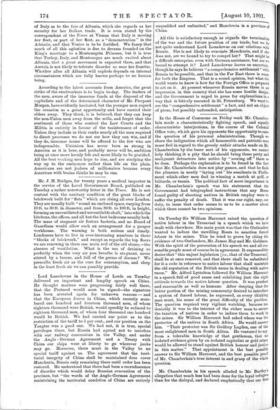On Tuesday Sir William Harcourt raised the question of native
labour in the Transvaal in a' speech -which we have dealt with elsewhere. His main point was that the Outlanders wanted to induce the unwilling Boers to sanction forced labour in the mines. This he tried to prove by- citing the evidence of two Outlanders, Mr. James Hay and Mr. Goldman. With the spirit of the peroration of his speech we and all rea- sonable people must of course be in agreement. It expressedthe desire that " this unjust legislation [i.e., that of the Transvaal] shall be at once removed, and that there shall be substituted for it a code in reference to native labour that shall maintain the old reputation of the British name in dealing with native races." Mr. Alfred Lyttelton followed Sir William Harcourt in a speech full of good sense and exhibiting just' the right attitude towards the native labour question. It was prudent and reasonable as well as humane. After denying that the better portion of the mining community desired to introduce a system of forced labour, he expressed, as every thinking man must, his sense 'of the great difficulty of the problem. The question required very vigilant watching, because un- deniably it was to the interest of the richer man to secure the taxation of natives in order to induce them to work in the mines. Sir William Harcourt had asked where was the protector of the natives in South Africa. He would answer him. " Their protector was Sir Godfrey Lagden, one of the most enlightened men in South Africa. He ventured to say, from a tolerable knowledge of that gentleman, that no isolated evidence given by an isolated capitalist or gold miner would be allowed to stand against British honour and justice in this matter." That appointment is the best possible answer to Sir William HarCourt, and the best possible proof of Mr. Chamberlain's true interest in and grasp of the whole question.


































 Previous page
Previous page